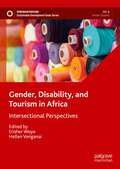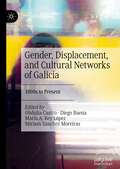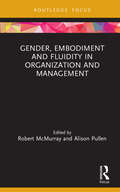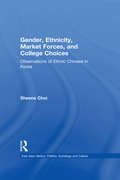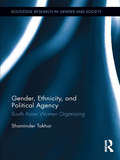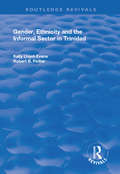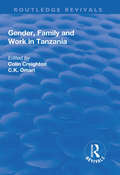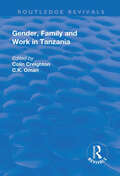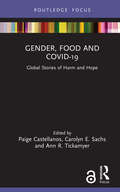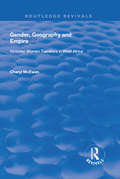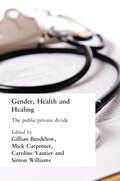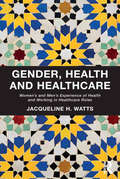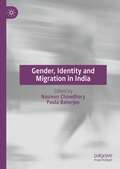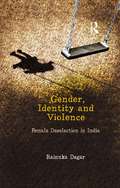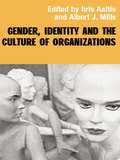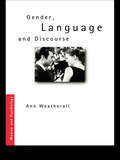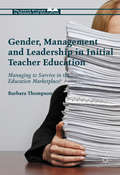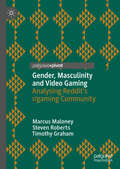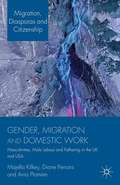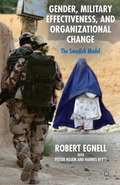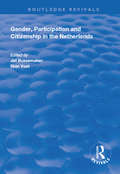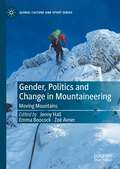- Table View
- List View
Gender, Disability, and Tourism in Africa: Intersectional Perspectives (Sustainable Development Goals Series)
by Erisher Woyo Hellen VenganaiThis book explores the intersection of gender and disability in the context of tourism. In part, the book foregrounds feminist theorising of intersectionality by examining how gender can overlap with other social identities to contribute to more systemic oppression, domination, discrimination, and marginalisation of certain categories of people. Our point of departure is that disability does not operate in isolation as it is constituted and experienced within an already gendered social and tourism environment. With substantial research on the intersection of gender and tourism on the one hand, and the intersection of disability and tourism on the other hand, the interconnectedness of gender and disability and the implications this has on tourism policy and practice remains understudied. Thus, the book provides a critical lens that helps unpack underlying assumptions about gender and disability while questioning the dominant ideas about gender and disability reproduced through tourism policies and institutional practices in an African context. This book will be of interest to scholars and researchers in Gender Studies, Disability Studies, and Tourism Studies, particularly those with a research interest in Africa.
Gender, Displacement, and Cultural Networks of Galicia: 1800s to Present
by Obdulia Castro Diego Baena María A. Rey López Miriam Sánchez MoreirasThis book, bringing together a multi-voiced dialogue between academic scholars and professionals from diverse fields, shares a comprehensive and heterogeneous look at the interdisciplinarity of Galician Studies while examining a chronologically broad range of subjects from the 1800s to the present. This volume carves out a distinct approach to gender studies investigating issues of culture, language, displacement, counterculture artists, and community projects as related to questions of politics, gender and class. Women, conceived as both individual and political bodies, are studied, among other things, as an example of what it means to struggle from the margins emphasizing the importance of looking at the opposition between the center and the peripheries when studying the relationship between space and culture.
Gender, Embodiment and Fluidity in Organization and Management (Routledge Focus on Women Writers in Organization Studies)
by Alison Pullen Robert McMurrayThis third volume in the Routledge Focus on Women Writers in Organization Studies series challenges us to think again about the implications of gender, embodiment and fluidity for organizing and managing. The themes of this book disrupt our understanding of dualisms between sex (men and women), gender (masculinity and femininity) and mind / body, and in so doing analyze the ways in which dominant power relations constitute heteronormativity throughout organizational history, thereby reinforcing mainstream management research and teaching. By centring the work of women writers, this book gives recognition to their thinking and praxis; each writer making political inroads into changing the lived experiences of those who have suffered discrimination, exclusion and marginalization as they consider the ways in which organizational knowledge has tended to privilege rather than problematize masculinity, fixity, control, normativity, violence and discrimination. The themes and authors (Acker, de Beauvoir, Halberstam, Kosofsky Sedgwick, Kristeva, Yourcenar) covered in this book are important precisely because they are not generally encountered in mainstream writing on management and organization studies. They are significant to the study and analysis of organizations because they demonstrate how our understanding of managing and organizing can be transformed when other voices/bodies/genders write on what it is work, live, lead and relate to self and others. All the writers turn to the ways in which individuals matter organizationally, acknowledging that lived experiences are a source of political and ethical practice. Each Woman Writer is introduced and analyzed by experts in organization studies. Further reading and accessible resources are also identified for those interested in knowing more. This book will be relevant to students, researchers and practitioners with an interest in business and management, organizational studies, critical management studies, gender studies and sociology. Like all the books in this series, it will also be of interest to anyone who wants to see, think and act differently.
Gender, Ethnicity and Market Forces: Observations of Ethnic Chinese in Korea (East Asia: History, Politics, Sociology and Culture)
by Sheena ChoiFirst published in 2001. Routledge is an imprint of Taylor & Francis, an informa company.
Gender, Ethnicity and Political Agency: South Asian Women Organizing (Routledge Research in Gender and Society #35)
by Shaminder TakharThis book examines how South Asian women’s collective agency is operationalized through civic organizations in the UK. Drawing on black feminist theory and third world feminism, it shows the complexity of political agency and its relationship to identity and subjectivity, and uses empirical research to demonstrate how women are empowered to resist domination. The historically racialized image of the South Asian woman as lacking in political agency is challenged through their long history of activism on the Indian subcontinent. The creation of "critical spaces" by South Asian women in the diaspora places them as active agents who have successfully influenced social policy on important issues such as forced marriage, domestic violence and sexuality. The engagement with the empirical data demonstrates the significance and impact of race, racism, sexism and religion on the lives of the women. The book brings to the fore the pursuit of equality, rights and justice, including multiculturalism and the often debated emancipatory role of religion.
Gender, Ethnicity and the Informal Sector in Trinidad
by Robert B. Potter Sally Lloyd-EvansThis title was first published in 2002. Throughout much of the developing world and especially in Africa and Latin America, the informal employment sector is growing spectacularly. This study focuses on the gender and ethnic aspects of the informal economy in Trinidad.
Gender, Family and Work in Tanzania
by Colin Creighton C.K. OmariThis title was first published in 2000. The essays in this volume explore the changing nature of family and gender relations in contemporary Tanzania. Particular attention is paid to the social construction of marriage and to the interplay of family life and gender relations with economic processes and forms of work. Many of the papers are based upon recent ethnographic and survey research; others provide a much needed historical perspective upon the change in family patterns and upon the ways in which gender and family relations are shaped by, and in turn help to shape, wider social institutions and processes.
Gender, Family and Work in Tanzania (Routledge Revivals)
by Colin Creighton C.K. OmariThis title was first published in 2000. The essays in this volume explore the changing nature of family and gender relations in contemporary Tanzania. Particular attention is paid to the social construction of marriage and to the interplay of family life and gender relations with economic processes and forms of work. Many of the papers are based upon recent ethnographic and survey research; others provide a much needed historical perspective upon the change in family patterns and upon the ways in which gender and family relations are shaped by, and in turn help to shape, wider social institutions and processes.
Gender, Food and COVID-19: Global Stories of Harm and Hope (Routledge Focus on Environment and Sustainability)
by Paige Castellanos, Carolyn E. Sachs and Ann R. TickamyerThis book documents how COVID-19 impacts gender, agriculture, and food systems across the globe with on-the-ground accounts and personal reflections from scholars, practitioners, and community members. During the coronavirus pandemic with many people under lockdown, continual agricultural production and access to food remain essential. Women provide much of the formal and informal work in agriculture and food production, distribution, and preparation often under precarious conditions. A cadre of scholars and practitioners from across the globe provide their timely observations on these issues as well as more personal reflections on its impact on their lives and work. Four major themes emerge from these accounts and are interwoven throughout: the pervasiveness of food insecurity, the ubiquity of women’s care work, food justice, and policies and research that can that can result in a resilience that reimagines the future for greater gender and intersectional equality. We identify what lessons we can learn from this global pandemic about research and practices related to gender, food, and agricultural systems to strive for more equitable arrangements. This book will be of great interest to students, scholars and practitioners working on gender and food and agriculture during this global pandemic and beyond.
Gender, Geography and Empire: Victorian Women Travellers in Africa
by Cheryl McEwanThis title was first published 2000: This text is intended to draw together two important developments in contemporary geography: firstly, the recognition of the need to write critical histories of geographical thought and, particularly, the relationship between modern geography and European imperialism; and secondly, the attempt by feminist geographers to countervail the absence of women in the histories. The author focuses on the narratives of British women travellers in West Africa between 1840 and 1915, exploring their contributions to British imperial culture, teh ways in which they wer empowered in the imperial context by virtue of both "race" and class, and their various representations of West African landscapes and peoples. The book argues for the inclusion of women and their experiences in histories of geographical thought and explores the possibilities and problems of combining feminist and post-colonial approaches to these histories.
Gender, Health and Healing: The Public/Private Divide
by Gillian Bendelow, Mick Carpenter, Caroline Vautier and Simon WilliamsWhat do we mean by 'gender' and how does this relate to health?How is 'biology' best understood?What does a focus on the division of labour bring to our understanding of health work?Is (gender) 'equity' in health possible?How have developments such as the resurgence of emotions and the new genetics affected these and other social relations at the turn of the century?These are just some of the questions addressed in Gender, Health and Healing in which a whole range of issues are brought together and connected to emerging concerns in contemporary life such as the new genetics and transformations in biomedical knowledge and practices. It offers a challenging assessment of gender relations and embodied practices across the public/private divide, using health and healing as paradigmatic examples.This thought-provoking volume lies at the intersection of gender studies, the sociology of health and healing, health policy, the critical analysis of scientific knowledge and the current debates around the body, health and emotions. Bringing together new and leading scholars in the field, it provides a unique critical overview of contemporary debates in health care for an interdisciplinary readership.
Gender, Health and Healthcare: Women’s and Men’s Experience of Health and Working in Healthcare Roles
by Jacqueline H. WattsHealth status and the experience of working in health care roles are both strongly shaped by gender and, although there have been attempts to incorporate ’gender awareness’ in both health and employment policies, the significance of gender in these areas continues to be marginalised within public debates and academic discourses. Taking a social constructionist perspective, Watts considers the ways in which gender impacts upon health in all its elements including access, technology, professionalisation, health promotion and health as an important sector of the labour market. She discusses gender as a developing and diversified category, exploring ideas about masculinity and the fluidity of gender boundaries in determining individual identity. Chapters that follow discuss men’s and women’s health; ideology of gender and health, specifically exploring different social norms and ideas about male and female health and the dominant ideological association between femaleness and caring; working for health with particular focus on the gendered interplay of caring and curing roles; technology and changes to gender, health and healthcare; health promotion as a gendered activity and, finally, the importance of introducing an intersectional approach beyond gender to articulate a deeper understanding of health in a postmodern context. The concluding chapter draws together these themes to underscore the importance of placing gender at the centre of health and health care delivery to fully take account of both the different life and health experiences of men and women and the gendered dimensions of working in health care.
Gender, Identity and Migration in India
by Nasreen Chowdhory Paula BanerjeeThe book focuses on voices of displaced women who constitute a critical part of the migration process through an unravelling of the engendered displacement. It draws attention to the various processes, methods and approaches by national and international human rights and humanitarian laws and principles, and the experiences of the relevant communities, organisations towards peaceful co-existence. The contributions to this volume embellish the argument that there is a direct correlation between an academic researcher's positionality, methods and trajectories of critical knowledge production. In particular, feminist epistemologies with specific emphasis on post-coloniality utilized in conjunction with scholarship related to transnational migration studies constitute a distinctly powerful vantage point for challenging methodological nationalism and the syndrome of 'seeing like the state' in the area of forced migration studies.
Gender, Identity and Violence: Female Deselection in India
by Rainuka DagarThe missing girls in India are not a new phenomenon. The British passed an Act to check female infanticide more than 100 years ago. Since 1960, India’s birth sex ratios have progressively declined from 994 to 910, implicating life-affecting gender violence. Backed by extensive field research, data and interviews, this book explores girl child deselection through cultural neglect, female infanticide and foeticide, and the role of caste and religion. The book spans critical socio-historical contexts and examines the practice of selective right to life. It views the effects of militancy and khaap panchayats, and studies women’s rights discourses and protective legal reforms. The gender imbalance is mapped globally and analysed in the specific conditions of the Indian states of Punjab and Haryana. The book examines the inter-linkages of gender hierarchies with male child preference and warns that theoretical analyses limited to female foeticide alone cannot address gender inequalities or change the cycle of violence. This will be valuable to scholars and researchers of gender and women studies, sociology, politics, and population and demographic studies. It will also be indispensable for women’s rights activists, NGOs, policy makers, government bodies, and those studying health and family planning.
Gender, Identity and the Culture of Organizations (Routledge Studies in Management, Organizations and Society)
by Iiris Aaltio Albert J. MillsGender, Identity and the Culture of Organizations considers how organizations operate as spaces in which minds are gendered and men and women constructed. This edited collection brings together four powerful themes that have developed within the field of organizational analysis over the past two decades: organizational culture; the gendering of organizations; post-modernism and organizational analysis; and critical approaches to management. A range of essays by distinguished writers from countries including the UK, USA, Canada, Denmark, Sweden, Finland, the Netherlands and Sweden, explore innovative methods for the critical theorizing of organizational cultures.In particular, the book reflects the growing interest in the impact of organizational identity formation and its implications for individuals and organizational outcomes in terms of gender. The book also introduces research designs, methods and methodologies by which can be used to explore the complex interrelationships between gender, identity and the culture of organizations.
Gender, Language and Discourse (Women and Psychology)
by Ann WeatherallIs language sexist? Do women and men speak different languages?Gender, Language and Discourse uniquely examines the contribution that psychological research - in particular, discursive psychology - has made to answering these questions. Until now, books on gender and language have tended to be from the sociolinguistic perspective and have focused on one of two issues - sexism in language or gender differences in speech. This book considers both issues and develops the idea that they shouldn't be viewed as mutually exclusive endeavours but rather as part of the same process - the social construction of gender. Ann Weatherall highlights the fresh insights that a social constructionist approach has made to these debates, and presents recent theoretical developments and empirical work in discursive psychology relevant to gender and language.Gender, Language and Discourse provides the most comprehensive and up-to-date discussion of the gender and language field from a psychological perspective. It will be invaluable to students and researchers in social psychology, cultural studies, education, linguistic anthropology and women's studies.
Gender, Management and Leadership in Initial Teacher Education: Managing to Survive in the Education Marketplace? (Palgrave Studies in Gender and Education)
by Barbara ThompsonThis book highlights the difficulties that women working as managers and leaders in initial teacher education face. Teacher education is at the forefront of education reforms and yet little is known about the professional lives of those who work within it. Whereas many women are moving into positions of authority in teacher training, some existing women managers are being marginalized within new internally differentiated layers of managerial structures. Yet other female managers, mainly new appointees, seem to endorse the discourses associated with new managerialist practices. Simultaneously some women who manage in teacher training are engaged in a struggle for survival individually and professionally. In the main, men seem to be missing from authority positions and will conclude that, in the current climate, the management of teacher training is ‘no job for a man’.
Gender, Masculinity and Video Gaming: Analysing Reddit's r/gaming Community
by Steven Roberts Marcus Maloney Timothy GrahamThis book examines gender attitudes in Reddit’s popular video gaming community subreddit, r/gaming. Video gaming has long been understood as a masculinised social space and, while increasing numbers of girls and women now engage in the pastime, boys and men remain the predominant social actors. Furthermore, the gaming community has been widely identified as a prime case study in broader concerns around ‘toxic’ masculinity and gendered online harassment. However, there is also underexamined evidence of a growing movement in the community coming forward to voice its collective opposition. Utilising an innovative combination of computational and qualitative methods, the research undertaken here exposes this fuller picture, revealing significant contestation and a spectrum of attitudes that mark out this popular gaming community as a battleground for gender (in)equality. Students and scholars across a range of disciplines, including gender studies, media studies, cultural studies, sociology, games studies and computer sciences, will find this book of interest.
Gender, Migration and Domestic Work
by Pierrette Hondagneu-Sotelo Ania Plomien Majella Kilkey Diane Perrons Hernan RamirezBased on studies conducted in the UK and USA, this book investigates the experiences of suppliers and consumers of masculinized domestic services, exploring issues such as increasing inequality, migration, the rise of commoditized domestic services, contemporary masculinities and the gendering of paid work.
Gender, Military Effectiveness, and Organizational Change
by Robert Egnell Petter Hojem Hannes BertsThrough extensive analysis of the Swedish Armed Forces this study explores the possibilities and pitfalls of implementing of a gender perspective in military organizations and operations. It established a number of important lessons for similar attempts in other countries and discusses the continued process of implementation in the Swedish military
Gender, Nation, and Nationalism: Perspectives of Tibetan Women in Exile
by Amrita SaikiaThis book looks at the question of the Tibetan nation from the perspective of Tibetan women in exile. It situates Tibetan women within the debate of Tibetan nation-building and nationalism in exile. In doing so, the book explores Tibetan women’s construction of the idea of the Tibetan nation, their contributions to Tibetan nationalism, their position in Tibetan society, and the nuances of identity. The author captures the experiences, views, and realities of Tibetan women in exile, drawing from interviews conducted with participants in three Tibetan settlements in India.This book is an important contribution to feminist discourse on gender, nation, and nationalism in the context of the Tibetans in exile. It will appeal to readers and scholars interested in Tibetan studies, nationalism, feminism, women’s studies, and Asian studies.
Gender, Participation and Agriculture: From Policy to Practice
by Faraha Nawaz Sangida Afrog RupaThis book presents an extensive study of women’s involvement in agricultural activities at the family level in rural Bangladesh, with a particular emphasis on their participation in decision-making. The authors examine the extent to which women are involved in decision-making regarding agricultural practices at family level. In addition to examining women’s contributions to various agricultural tasks, the research expands its scope to include discussions on gender inequality and empowerment, integrating these concepts into the decision-making framework. The authors argue that true participation should not only address the involvement of women in agriculture but also consider their influence on decision-making processes. They stress the importance of factors such as autonomy, control over resources, and self-confidence, which play a crucial role in shaping women’s decision-making ability within the family. Moreover, the research identifies several key barriers to participation, including entrenched patriarchal norms, societal cultural expectations, and institutional challenges, which hinder women’s active involvement in decision-making. The authors advocate for policy reforms and institutional changes to address these challenges, urging government bodies to align policies with their recommendations. The book provides valuable insights for policymakers, government officials, and NGOs working to promote gender-based approach and improve women’s empowerment in rural communities.
Gender, Participation and Citizenship in the Netherlands (Routledge Revivals)
by Jet Bussemaker Rian VoetPublished in 1998, this is an edited volume of papers on the theme of participation and citizenship for women. It focuses particularly on the necessary conditions for full participation of women as citizens within a modern liberal democracy. For this question it takes the Netherlands as an interesting case study, because it shows the need for a close connection between social and political participation. The editors aim to draw together often separate discussions about citizenship in international literature - a political-theoretical discussion of democracy and a social-policy discussion on the welfare state. The papers address issues including the labour market, public goods, welfare laws, affirmative action programmes and future development for girls. The book also develops the interrelation of social and political participation from the perspective of citizenship. It relates information on the Dutch case study to international comparative research on democracy and welfare states, as well as to broader international discussions on gender and citizenship.
Gender, Politics and Change in Mountaineering: Moving Mountains (Global Culture and Sport Series)
by Jenny Hall Emma Boocock Zoë AvnerThis book is the first edited collection to offer an intersectional account of gender in mountaineering adventure sports and leisure. It provides original theoretical, methodological, and empirical insights into mountain spaces as sites of socio-cultural production and transformation. The book shows how gender matters in the twenty-first century, and illustrates that there is a need for greater efforts to mainstream difference in representations and governance structures if we are to improve equality in adventure, sporting and leisure spaces. The interdisciplinary volume represents scholars from theoretical as well as applied perspectives across adventure, tourism, sport science, sports coaching, psychology, geography, sociology and outdoor studies.
Gender, Politics and Society in Ukraine
by Olena Hankivsky Anastasiya SalnykovaGender, Politics, and Society in Ukraine is the first collection to examine how political, social, and economic transitions in post-Communist Ukraine are transforming gender roles and relations within the country. Leading Western and Ukrainian scholars and practitioners address a wide range of effects associated with and reinforced by these transitions - including the breakdown of the general welfare system, the lack of progress in the development of the healthcare system, gender inequality in political representation, the patriarchal nature of nation building, human trafficking, domestic violence, changing conceptions of fatherhood and masculinity, homelessness, and LGBT issues - from a variety of methodological and disciplinary perspectives.Gender, Politics, and Society in Ukraine is particularly innovative in its exploration of both women's and men's experiences and the ways in which gender relations shift over time in societies undergoing transitions to democracy. As such, this volume furthers the understanding of the complex obstacles and challenges of working towards gender equality in evolving democracies and identifies future priorities for research, politics, and policy development.
